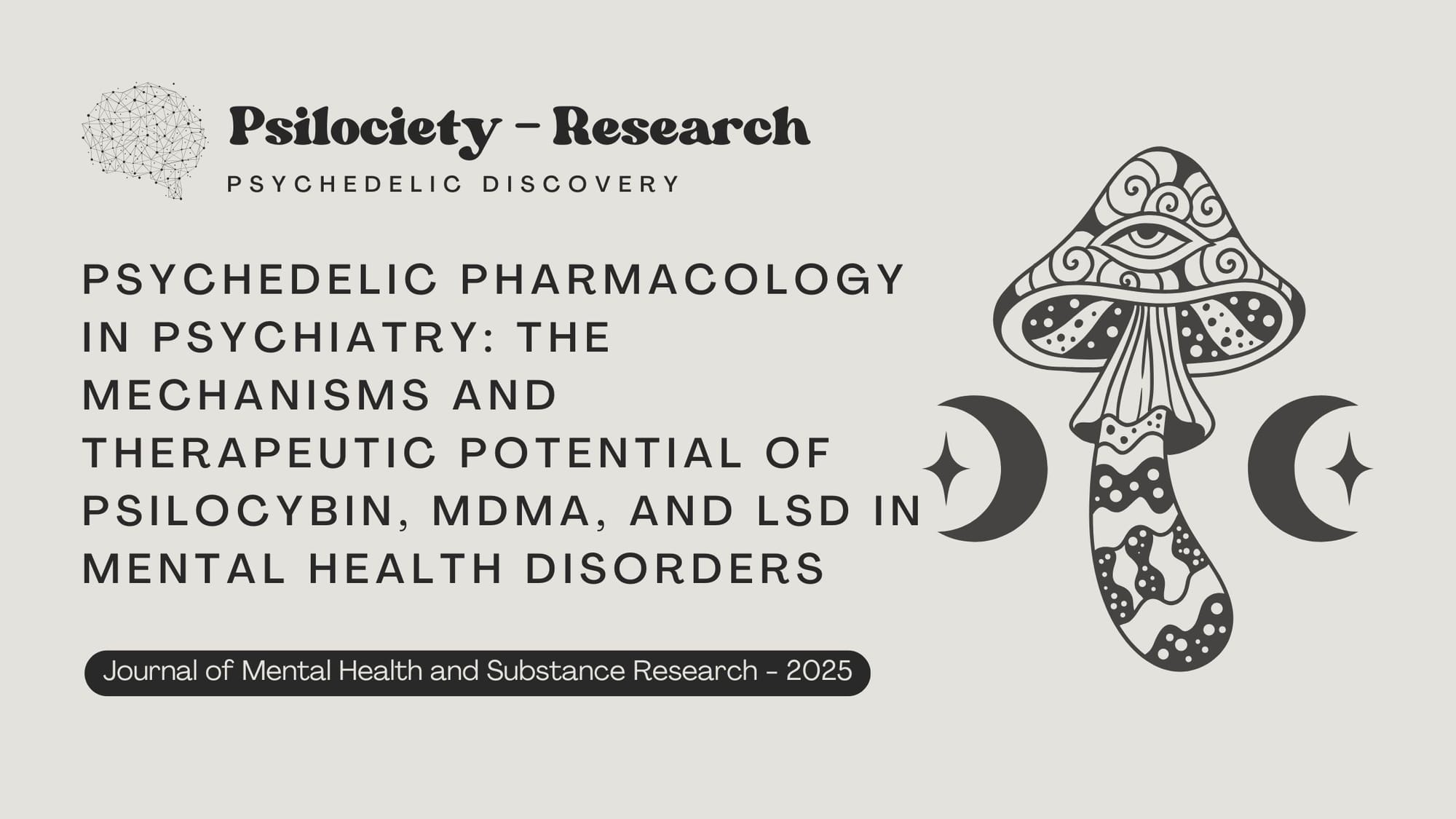Psychedelic Pharmacology in Psychiatry: The Mechanisms and Therapeutic Potential of Psilocybin, MDMA, and LSD in Mental Health Disorders
This review examines the mechanisms and therapeutic potential of psilocybin, MDMA, and LSD for depression, PTSD, and anxiety disorders.

Title & Description
- Paper Title: Psychedelic Pharmacology in Psychiatry: The Mechanisms and Therapeutic Potential of Psilocybin, MDMA, and LSD in Mental Health Disorders
- Published In: Journal of Mental Health and Substance Research
- Publish date: March 11, 2025
- Authors: Dr. Hafiz Shafique Ahmad, Muhammad Waqar Ali, Usman Ul Haq
- Objective: To review the pharmacological mechanisms of psilocybin, MDMA, and LSD, and their therapeutic applications for treatment-resistant depression, PTSD, and anxiety disorders.
- Importance: Synthesizes current research on the clinical efficacy and mechanisms of action of these psychedelics, contributing to the understanding of their potential in psychiatric treatment.
Summary & Takeaways
Key Takeaway: Psilocybin, MDMA, and LSD exhibit unique neurobiological effects that promote neuroplasticity, emotional processing, and therapeutic breakthroughs, making them promising candidates for treating psychiatric disorders.
Practical Application:
Clinicians and researchers can use this review to guide future studies and clinical applications of psychedelic-assisted therapy for conditions like depression, PTSD, and anxiety.
Key Background Information
- Context: Standard psychiatric treatments, such as SSRIs and benzodiazepines, fail to help a significant proportion of patients, necessitating alternative approaches. Psychedelic-assisted therapy has shown promise in clinical trials.
- Hypothesis: Psychedelic substances exert their therapeutic effects by modulating serotonin receptors, enhancing neuroplasticity, and facilitating emotional breakthroughs.
Methodology
- Study Design: Literature review of clinical trials and neurobiological research on psilocybin, MDMA, and LSD.
- Participants: Studies included in the review encompass various clinical populations with treatment-resistant depression, PTSD, and anxiety disorders.
- Intervention/Exposure: Administration of psilocybin, MDMA, and LSD in controlled therapeutic settings.
- Controls: Placebo and active control comparisons where applicable.
- Duration: Includes short-term and long-term outcome measures from multiple studies.
Key Findings
Primary Outcomes:
- Psilocybin:
- Facilitates emotional openness and reduces depressive symptoms.
- Induces neuroplasticity, leading to lasting changes in mood and cognition.
- Effective in reducing end-of-life anxiety in terminal patients.
- MDMA:
- Enhances emotional processing and reduces fear in PTSD patients.
- Increases oxytocin levels, promoting social bonding and trust.
- Produces long-term symptom relief after only a few sessions.
- LSD:
- Modulates serotonin receptors to alter perception and cognition.
- Shows potential in reducing existential anxiety and depression.
- Increases neuroplasticity similarly to psilocybin.
Secondary Outcomes:
- Psychedelic-assisted therapy has a favorable safety profile when conducted in controlled settings.
- Challenges include regulatory hurdles, ethical concerns, and potential adverse effects such as temporary anxiety or cardiovascular strain.
- The effectiveness of psychedelics in psychiatric treatment appears to stem from their ability to facilitate introspection, emotional breakthroughs, and reorganization of thought patterns.
Interpretation & Implications
- Conclusion: Psychedelics like psilocybin, MDMA, and LSD hold significant potential for psychiatric treatment, particularly for conditions that do not respond to conventional therapies.
- Implications: More large-scale, long-term studies are needed to further validate their efficacy and safety, and regulatory frameworks should evolve to accommodate their therapeutic use.
- Limitations: Current research is limited by small sample sizes and regulatory constraints that restrict widespread clinical implementation.
Researchers & Publication
- Researchers: Dr. Hafiz Shafique Ahmad, Muhammad Waqar Ali, Usman Ul Haq
- Publication Name: Journal of Mental Health and Substance Research
- Study URL: https://doi.org/10.62019/r713mw08

